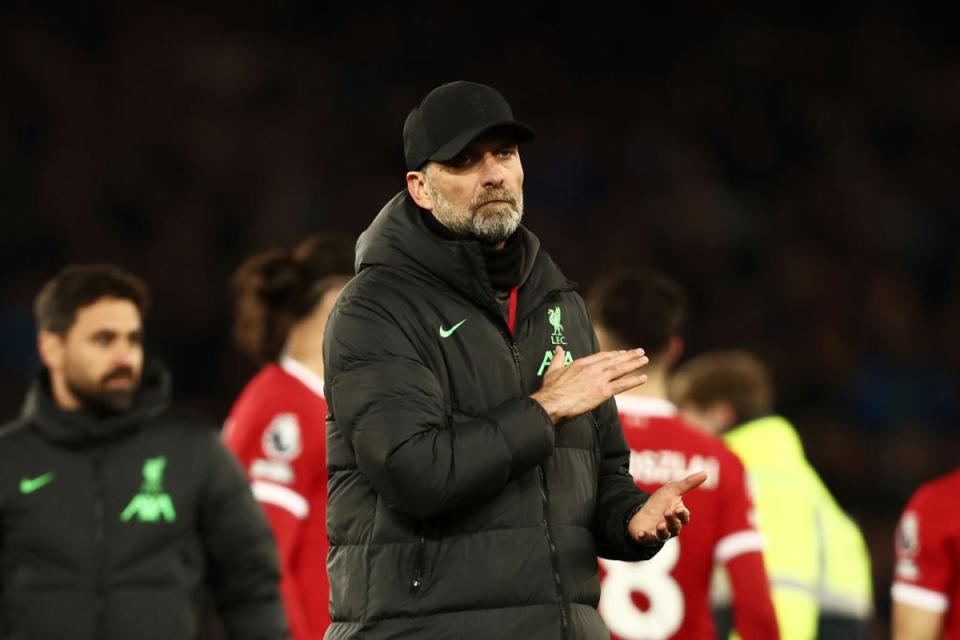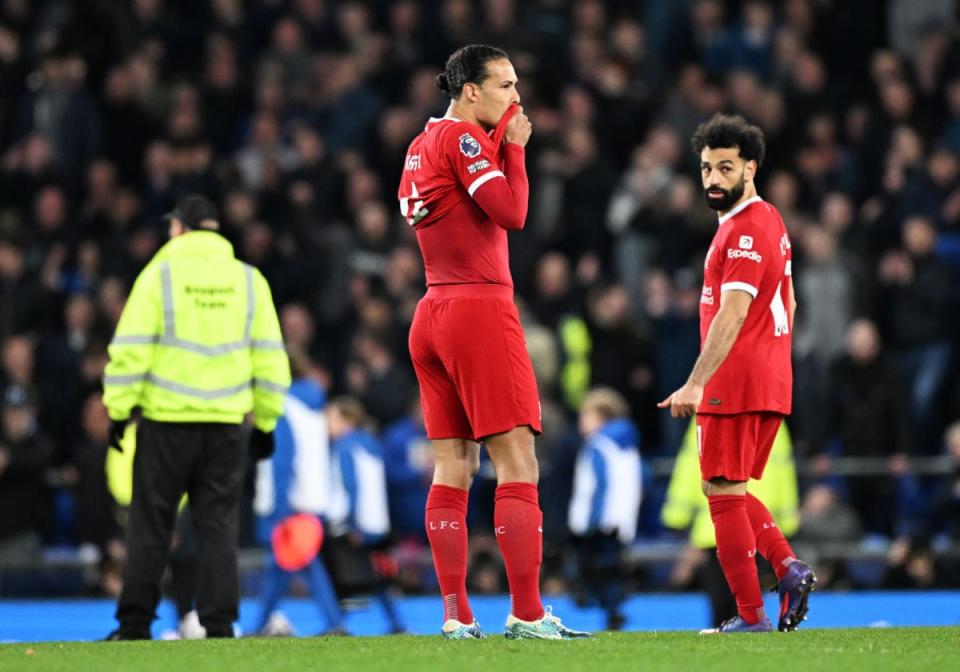Jurgen Klopp has lost Liverpool’s greatest strength – just as time runs out

There is a chorus that Jurgen Klopp is used to hearing in his homeland. But not about his sides; never about his sides. Until, amid the din at Goodison Park on Wednesday, the Liverpool was tempted to launch into a one-man rendition of an accusation. “In Germany, when the crowd is not happy with the team and they think they are not fighting enough, they sing a song, ‘wir wollen euch kampfen sehen’,” he said, acting as his own interpreter. “That translates into ‘we want to see you fight’.
“I was close to singing that! Never has one of my teams heard that ever. Never. I never heard them say my team didn’t fight because my team [always] went for it. And now ...wow ... how can that happen?” Some 36 hours have passed after the final whistle in Klopp’s last and worst Merseyside derby and, if his mood is more reflective, the underlying emotions remain the same. “I can’t remember ever being as disappointed and frustrated as I was after the Everton game,” he said.
Because the guarantee from a Klopp team tends to be a battling spirit. There is a reason why, during difficult spells, he says they have to “fight through” it. The work comes first, the fluency later. This season has been underpinned with evidence of fight: without it, Liverpool would not have kept coming from behind. But against Everton, in the 487th of what will prove 491 matches as Liverpool, there was no fight, none of the defining characteristics.

It left Klopp scrambling for explanations. “It’s difficult,” he said. “It’s really strange but I hated our game. We were not even close to what we want to be, I never understood it like that where I just sit there and [think] ‘well, he does not want it, or he doesn’t want it’ because I know they want.
“It wasn’t the first [below par] one but it was the worst one. Crystal Palace wasn’t even close [to be being as bad].” Klopp was less critical against Palace than he was after the 3-0 loss to Atalanta. But after Everton, the reality is that Liverpool’s two poorest performances of the season have come in the space of two weeks.
At such times, his default reaction is to look in the mirror. “I blame myself 100 per cent because we were not in the mood,” Klopp said. “The boys are incredible footballers and I have to create a situation where they can be the best version of themselves and that is where I have failed. I didn’t see any version of that in the Everton game.”
The counterargument is that Klopp has fashioned the conditions where nearly all of his squad have produced the best football of their careers for him, in some cases this season. A group – whether Curtis Jones or Conor Bradley, Jarell Quansah or Wataru Endo, Harvey Elliott or Jayden Danns – have delivered more than felt realistic. “Did anyone expect us to become champions at the start of the season? No, of course not,” Klopp said. But the context has created the sense an opportunity, however unexpected, has been missed. “No one here is happy at all,” he said. “We cannot go back to the point where we say it is good enough. It is but because we were that close we are disappointed.”

Liverpool have only faltered at the last. The highs have easily outnumbered the lows this season. If it felt re-energising, the way a new young team conjured results appeared galvanising, Klopp’s January announcement of his resignation reflected the toll defeats take on him. He assumes responsibility, forever trying to shield players in public, accepting when performances are substandard but blaming only himself. It is partly why he found last season so hard, which he described as a “dog year”, such was its capacity to age him, why he felt he could not face another campaign like 2020-21 or 2022-23 without recharging his batteries.
And if the factors behind Liverpool’s recent relapse, he feels, are a packed fixture list, the injuries players such as Mohamed Salah and Trent Alexander-Arnold have had when in form, and the difficulty of returning to their consistent best, he concluded: “We don’t go for easy excuses. We think, the boys do as well, that we should do better.”
Now he has four games to go before some time off when he will be spared the despondency defeat brings. “I came home, [my mood] was not great, when I woke up it was not great, went to the office, it was not great,” Klopp admitted. “But it got better, step by step. So that is how it is. I believe as well that you have to feel defeats and it was a tough one [to take]. But I’m absolutely fine. As I said, you can lose a game but if you don’t learn from it, it is a double defeat.”
For now, the first lesson is to fight so the manager does not feel like singing when he is losing.

